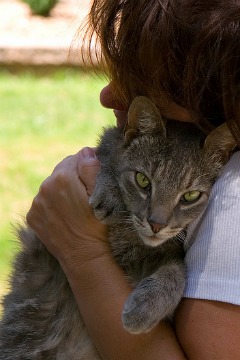Here is Petopia’s personal top 10 list of “essential responsibilities,” all of which have been gleaned from a decade of work dabbling in animal care.
1. Believe in “Till Death Do Us Part”
When you adopt a pet, you are committing to care for the animal for his or her entire life. Now, we all know that life has a way of changing unexpectedly. Should your ability to care for your animal companion change, or if your companion has the potential to live for many decades (such as a parrot or tortoise), your responsibility should be to carefully plan who will be the next care provider for him or her.
2. Know It’s “For Better or Worse”
Just as in human relationships, commitment to a companion is to provide love and care “for better or for worse.” Undoubtedly, there will be struggles – delayed house training, separation anxiety, destroyed furniture, chronic health issues (no doubt, you can add to this list). When opening your home and your heart to an animal, be willing and prepared to invest the time, energy and financial resources necessary to successfully manage any rough spots. Such challenges are a normal part of life. The silver lining is that they help us appreciate and enjoy the smooth times so much more.
3. Guarantee Food and Shelter
Perhaps the most obvious responsibility on this list, provision of the basic necessities of life, is an important one. Water and nutritious food are a must, as is protection from the elements. Given the choice, we firmly believe that the vast majority of dogs and cats would prefer to be housed indoors, living side-by-side with their favourite humans. From their perspective, a bed in the garage or a doghouse in the backyard is invariably a second choice.
4. Provide Emotional Nutrition
The kitty who persistently meows at an unanswered door and the dog who is chained to a tree in the backyard are both in heartbreakingly inhumane situations. The need for emotional nourishment is just as great (if not greater) than the need for what is in the food bowl. Every animal’s emotional needs are different, but every animal deserves to have their emotional needs fulfilled. Your responsibility is to recognize and fill such needs (overfilling is perfectly acceptable!).
5. Commit to Preventive Health Care
There is a rather long “to do” list when it comes to proactively preserving your animal’s health. Protection from harm, balanced nutrition, exercise and annual checkups are a good start to any list. We encourage you to work with your veterinarian or a trusted and experienced animal care-giver to create your own “to do” list for your pets.
6. Practice Responsible Parenting
If I possessed a magic wand, we would personally like to see all the homeless animals in Singapore placed in loving homes before any more dogs or cats are bred. Without that magic wand in hand, our best bet is to appeal to you to do whatever it takes to prevent your animal companion from reproducing. If you are not convinced this is an important issue, we encourage you to visit SPCA and other animal shelters to see for yourself how many pets are currently homeless.
7. Ensure Your Pet’s Safe Return
Should the unthinkable happen and your companion becomes lost, the likelihood of a happy ending is greatly enhanced if he or she has been microchipped (and the microchip registry has your current contact information). Another critical safeguard is a collar sporting a current identification tag.
8. Create a Model Citizen
Behavioural issues are the number-one reason dogs and cats are relinquished to shelters. Rehoming such animals is a huge challenge, and the unfortunate end result is often euthanasia. Do the work early on to create a model citizen by participating in training classes or one-on-one work with a trainer. You and your companion will both benefit.
9. Advocate for Your Companion’s Health
Whether selecting a vaccination protocol or making a life-or-death decision, your active involvement as a medical advocate for your companion is imperative. You may not have realized it, but at the time of adoption, you accepted “mandatory responsibility” to make medical decisions on your companion’s behalf. Yes, your veterinarian’s recommendations are important, and he or she is an important member of your companion’s health care team, but you are “team captain” because no one knows your companion as well as you do.
10. Plan for End-of-Life Care
Unfortunately, sick or aged animals rarely simply pass away peacefully and comfortably in their sleep. In most cases, it is incumbent upon their human family members to decide upon and create an end of life for the companion(whether via euthanasia or hospice care) that is managed humanely. If you share your life with companions, you will undoubtedly find yourself faced with this all-important responsibility, and it is up to you to make sure your animal is as comfortable, free of pain, and well-loved as possible.




